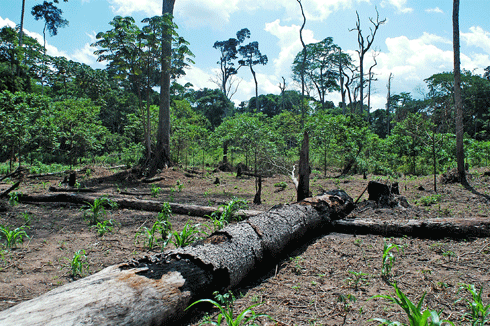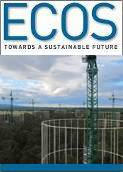
|
Published: 15 October 2012
Crime accounts for lion’s share of tropical deforestation
Organised crime is responsible for 50-90 per cent of logging in the tropical countries of the Amazon basin, Central Africa and South East Asia, threatening efforts to combat climate change and deforestation, conserve wildlife and eradicate poverty, according to a new report from the UN Environment Programme (UNEP) and INTERPOL.
Illegal logging now accounts for 15-30 per cent of the total global trade.
Forests bind carbon dioxide and store it, which helps mitigate climate change. Deforestation, mostly within tropical rainforests, is responsible for an estimated 17 per cent of all man-made emissions – 50 per cent more than that from ships, aviation and land transport combined.
The new report, ‘Green Carbon: Black Trade’, claims that the illegal trade, worth US$30-100 billion annually, is hampering the international initiatives, Reducing Emissions from Deforestation and forest Degradation (REDD) and the more recently revised and expanded REDD+. UNEP says these are important tools for environmental protection, sustainable development, job creation and global emissions reduction.
According to the report, if REDD+ is to be sustainable over the long term, payments to communities for their conservation efforts need to be higher than the returns from activities that lead to environmental degradation.
‘Funding to better manage forests represents an enormous opportunity to not only address climate change but to reduce rates of deforestation, improve water supplies, cut soil erosion and generate decent green jobs in natural resource management,’ said Achim Steiner, UN Under-Secretary General and UNEP Executive Director.
‘Illegal logging can, however, undermine this effort, robbing countries and communities of a sustainable future, if the unlawful activities are more profitable than the lawful ones under REDD+,’ he added.
The report describes how criminal groups are combining old-fashioned tactics such as bribes along with high-tech methods such as hacking government websites. Illegal operations are also becoming more sophisticated as loggers and dealers shift activities between regions and countries to avoid local and international policing efforts.
UNEP warns that most affected nations have been putting their efforts into encouraging and creating incentives for legal trade – not combating crime.
Ronald K. Noble, Secretary General of INTERPOL, points out that, ‘The threat posed to the environment by transnational organised crime requires a strong, effective and innovative international law enforcement response to protect these natural resources and combat the corruption and violence tied to this type of crime, which can also affect a country’s stability and security.’
In response to the findings, INTERPOL and UNEP have established an international pilot program called LEAF – Law Enforcement Assistance to Forests.
The report describes 30 methods used by criminal groups to procure and launder illegal timber, such as falsifying logging permits, bribes, logging beyond concessions, hacking government websites to obtain or change electronic permits, mixing illegally logged wood with legally cut timber, and selling wood from wild forests as plantation timber.
In many cases, corrupt officials, local military and police emerge with revenues up to ten times the revenue available through legal activity. This seriously undermines much needed investments in sustainable forest operations and alternative livelihoods in poorer countries.
To counter criminal and illegal activity, the report recommends that jurisdictions increase policing through adequate training; establish a central register for land-clearing permits; restrict the flow of logged timber through suspect regions; carry out more tax fraud investigations; and discourage investment in enterprises in regions known or suspected to have high levels of illegal logging.
Source: UNEP




